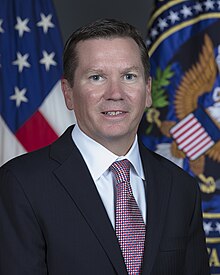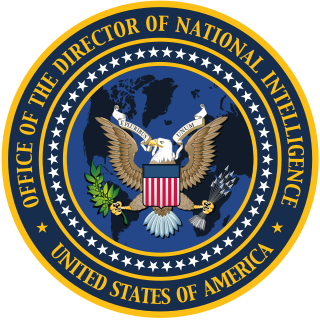
The director of national intelligence (DNI) is a senior, cabinet-level United States government official, required by the Intelligence Reform and Terrorism Prevention Act of 2004 to serve as executive head of the United States Intelligence Community (IC) and to direct and oversee the National Intelligence Program (NIP). All IC agencies report directly to the DNI. The DNI also serves, upon invitation, as an advisor to the president of the United States, the National Security Council and the Homeland Security Council on all intelligence matters. The DNI, supported by the Office of the Director of National Intelligence (ODNI), produces the President's Daily Brief (PDB), a classified document including intelligence from all IC agencies, handed each morning to the president of the United States.
In the United States, Office of Inspector General (OIG) is a generic term for the oversight division of a federal or state agency aimed at preventing inefficient or unlawful operations within their parent agency. Such offices are attached to many federal executive departments, independent federal agencies, as well as state and local governments. Each office includes an inspector general and employees charged with identifying, auditing, and investigating fraud, waste, abuse, embezzlement and mismanagement of any kind within the executive department.

The Office of Legal Counsel (OLC) is an office in the United States Department of Justice that assists the Attorney General's position as legal adviser to the President and all executive branch agencies. It drafts legal opinions of the Attorney General and provides its own written opinions and other advice in response to requests from the Counsel to the President, the various agencies of the Executive Branch, and other components of the Department of Justice. The Office reviews and comments on the constitutionality of pending legislation. The office reviews any executive orders and substantive proclamations for legality if the President proposes them. All proposed orders of the Attorney General and regulations that require the Attorney General's approval are reviewed. It also performs a variety of special assignments referred by the Attorney General or the Deputy Attorney General.

Joseph Maguire is an American officer who served as Director of the National Counterterrorism Center and Acting Director of National Intelligence under President Donald Trump. He retired from the United States Navy as a vice admiral in 2010 after 36 years of military service. Prior to retiring from active duty, he was the deputy director for strategic operational planning at National Counterterrorism Center (NCTC).

William Pelham Barr is an American attorney who served as the United States attorney general in the administration of President George H. W. Bush from 1991 to 1993 and again in the administration of President Donald Trump from 2019 to 2020.

Kurt Douglas Volker is an American diplomat who served as George W. Bush's last U.S. Ambassador to NATO. Later he served as executive director of the McCain Institute for International Leadership and in a volunteer capacity as Donald J. Trump's U.S. Special Representative for Ukraine until his resignation on September 27, 2019.
The Intelligence Community Whistleblower Protection Act of 1998, amending the Central Intelligence Agency Act of 1949 and the Inspector General Act of 1978, sets forth a procedure for employees and contractors of specified federal intelligence agencies to report complaints or information to the United States Congress about serious problems involving intelligence activities.
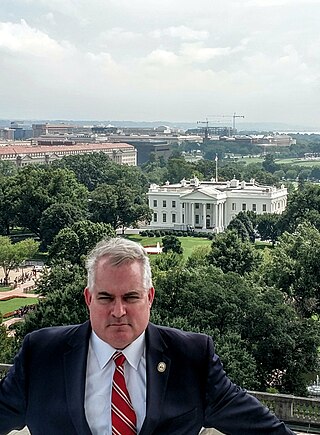
Daniel P. Meyer is an attorney admitted in the District of Columbia and is currently the Managing Partner of the Washington D.C. Office of Tully Rinckey, PLLC, an international law firm headquartered at Albany, New York, and co-founded by Mathew Tully and Greg Rinckey.
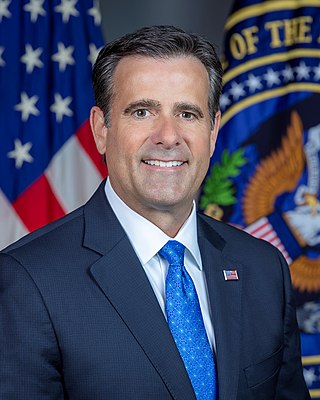
John Lee Ratcliffe is an American politician and attorney who served as the Director of National Intelligence from 2020 to 2021. He previously served as the U.S. representative for Texas's 4th district from 2015 to 2020. During his time in Congress, Ratcliffe was regarded as one of the most conservative members. Ratcliffe also served as Mayor of Heath, Texas, from 2004 to 2012 and acting United States Attorney for the Eastern District of Texas from May 2007 to April 2008.

The Intelligence Authorization Act for Fiscal Year 2014 is a U.S. public law that authorizes appropriations for fiscal year 2014 for intelligence activities of the U.S. government. The law authorizes there to be funding for intelligence agencies such as the Central Intelligence Agency or the National Security Agency, but a separate appropriations bill would also have to pass in order for those agencies to receive any money.

Steven Andrew Engel is an American lawyer. He served as the United States assistant attorney general for the Office of Legal Counsel in the Trump administration. Engel, who previously worked in the George W. Bush administration as deputy assistant attorney general in the Office of Legal Counsel, was nominated by President Donald Trump on January 31, 2017, and confirmed on November 7, 2017.

The Inspector General Act of 1978 is a United States federal law that created Inspectors General for federal agencies and provides broad authorities for overseeing programs, promoting efficiencies, and detecting fraud, waste, and mismanagement throughout the federal government.

Russian interference in the 2020 United States elections was a matter of concern at the highest level of national security within the United States government, in addition to the computer and social media industries. In 2020, the RAND Corporation was one of the first to release research describing Russia's playbook for interfering in U.S. elections, developed machine-learning tools to detect the interference, and tested strategies to counter Russian interference. In February and August 2020, United States Intelligence Community (USIC) experts warned members of Congress that Russia was interfering in the 2020 presidential election in then-President Donald Trump's favor. USIC analysis released by the Office of the Director of National Intelligence (DNI) in March 2021 found that proxies of Russian intelligence promoted and laundered misleading or unsubstantiated narratives about Joe Biden "to US media organizations, US officials, and prominent US individuals, including some close to former President Trump and his administration." The New York Times reported in May 2021 that federal investigators in Brooklyn began a criminal investigation late in the Trump administration into possible efforts by several current and former Ukrainian officials to spread unsubstantiated allegations about corruption by Joe Biden, including whether they had used Trump personal attorney Rudy Giuliani as a channel.

The Trump–Ukraine scandal was a U.S. political scandal that arose from the discovery of U.S. President Donald Trump's attempts to coerce Ukraine and other countries into providing damaging narratives about 2020 Democratic Party presidential candidate Joe Biden and giving misinformation relating to Russian interference in the 2016 United States elections. Trump enlisted surrogates within and outside his official administration, including his personal lawyer Rudy Giuliani and Attorney General William Barr, to pressure Ukraine and other foreign governments to cooperate in supporting conspiracy theories concerning American politics. Trump blocked payment of a congressionally-mandated $400 million military aid package in an attempt to obtain quid pro quo cooperation from Ukrainian president Volodymyr Zelenskyy. Trump released the aid after becoming aware of a whistleblower complaint about his activities relating to Ukraine, before the complaint was known by Congress or the public. A number of contacts were established between the White House and the government of Ukraine, culminating in a phone call between Trump and Zelenskyy on July 25, 2019.

The inquiry process which preceded the first impeachment of Donald Trump, 45th president of the United States, was initiated by then-House Speaker Nancy Pelosi on September 24, 2019, after a whistleblower alleged that Donald Trump may have abused the power of the presidency. Trump was accused of withholding military aid as a means of pressuring newly elected president of Ukraine Volodymyr Zelensky to pursue investigations of Joe Biden and his son Hunter and to investigate a conspiracy theory that Ukraine, not Russia, was behind interference in the 2016 presidential election. More than a week after Trump had put a hold on the previously approved aid, he made these requests in a July 25 phone call with the Ukrainian president, which the whistleblower said was intended to help Trump's reelection bid.

Andrew P. Bakaj is a Washington, D.C. attorney and former intelligence officer with the Central Intelligence Agency. He was the principal attorney representing the whistleblower who filed the initial complaint that led to the launch of multiple investigations by the United States Congress into the Trump–Ukraine scandal, the impeachment inquiry into President Donald Trump, and, ultimately, the first impeachment of Donald Trump.

The first impeachment trial of Donald Trump, the 45th president of the United States, began in the U.S. Senate on January 16, 2020, and concluded with his acquittal on February 5. After an inquiry between September and November 2019, President Trump was impeached by the U.S. House of Representatives on December 18, 2019; the articles of impeachment charged him with abuse of power and obstruction of Congress. It was the third impeachment trial of a U.S. president, preceded by those of Andrew Johnson and of Bill Clinton.
In April and May 2020, United States President Donald Trump dismissed the inspectors general (IGs) of five cabinet departments in the space of six weeks. The inspectors general removed were Michael K. Atkinson, Intelligence, on April 3; Glenn Fine (acting), Defense, April 7; Christi Grimm (acting), Health and Human Services, May 1; Mitch Behm (acting), Transportation, May 15; and Steve Linick, State, May 15. In four of the cases the announcement was made late on a Friday night in a classic Friday news dump. In several cases the fired IGs had taken an action which Trump disliked, so that the dismissals were widely described as retaliation. In two other cases, questions were raised about whether the dismissals related to ongoing IG investigations into the conduct of the cabinet secretary in charge of that department. The cumulative firings were often described as a "purge" or as a "war on watchdogs".
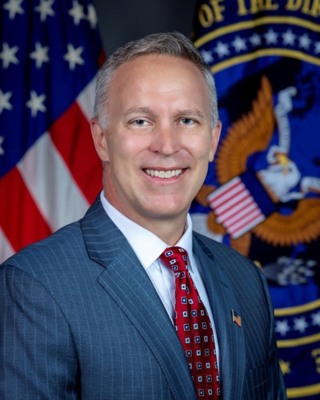
Thomas Andrew Monheim is an American intelligence officer serving as the inspector general of the United States Intelligence Community. He was confirmed by the Senate on September 30, 2021, to be the permanent inspector general. He previously served as general counsel of the National Geospatial-Intelligence Agency.

This is a timeline of major events in second half of 2019 related to the investigations into the myriad links between Trump associates and Russian officials and spies that are suspected of being inappropriate, relating to the Russian interference in the 2016 United States elections. It follows the timeline of Russian interference in the 2016 United States elections before and after July 2016 up until election day November 8, and the transition, the first and second halves of 2017, the first and second halves of 2018, and the first half of 2019, but precedes that of 2020 and 2021.
